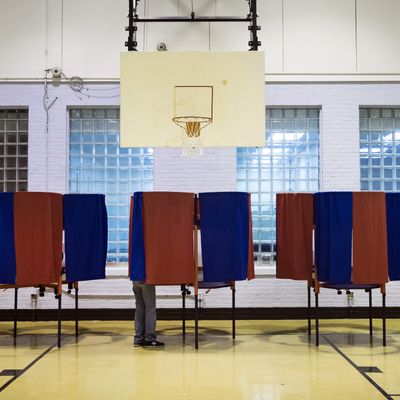
Bernie Sanders’s win in the New Hampshire primary, added to his shared victory in Iowa with Pete Buttigieg, makes him the unmistakable
Democratic front-runner at this stage of the contest. But his first-place finish wasn’t the only consequential result.
As my colleague Eric Levitz argues (and as I have suggested as well), the 2020 Democratic contest is looking more and more like it could soon devolve into a Bernie Sanders–Michael Bloomberg cage match, with these two late-septuagenarian Jewish men from in and around New York representing far-distant poles of sentiment within the party. Perhaps rank-and-file and elite Democrats can pick sides and slug it out and then somehow quickly pull together for the general election. But it’s very likely this prospect will generate a fresh longing for some sort of third “unity” alternative to the democratic socialist and the ex-Republican.
Who would that be, though? At one point Joe Biden was thought to be a potentially unifying figure thanks to his biracial appeal, his apparent electability, and perhaps even the likelihood that he’d get out of the way in 2024 and let a younger and more progressive leadership cadre emerge. But Biden’s poor performance in both Iowa (fourth place) and New Hampshire (fifth place), his sinking poll ratings elsewhere, and his poor fundraising are all signs he won’t wear well on primary or general electorates in the future, even if he keeps limping along. Kamala Harris and Cory Booker were candidates with some potential as unity figures, but they’re both long gone. Elizabeth Warren has lately been campaigning on a party-unity theme, but she had terribly underwhelming performances in Iowa (where she was thought to have the best organization) and in New Hampshire (next door to her own Massachusetts), and has run a campaign that has alienated some moderates. Like Biden, Warren is just one likely future defeat away from being dismissed.
So how about the candidates who finished a strong second and third in New Hampshire, Pete Buttigieg and Amy Klobuchar? Could either of them offer a “compromise” alternative to Sanders and Bloomberg?
That’s hard to imagine unless one or the other or both of them begins to broaden their support into minority communities, which they didn’t have to do in Iowa or New Hampshire and have shown no signs of doing in polling of later states. As Ron Brownstein has explained, Buttigieg and Klobuchar may soon hit a wall. After months of campaigning in South Carolina, Mayor Pete was still at one half of one percent among African-American voters there in a recent East Carolina University survey. And he’s toxic to a lot of Bernie Sanders’s millennial supporters. Amy Klobuchar is similarly stuck in a ghetto of “moderates, voters older than 45, and those with college degrees.” African-American activists, including those in her own Minnesota, have some unfinished business with her record as a prosecutor before she went to Washington. The Minnesotan also doesn’t have a lot of money, and has no campaign infrastructure in the states ahead.
It’s important to remember that in the past, Democratic “moderates” have only won nominations when they had strong minority support along the way. That was true from Jimmy Carter to Bill Clinton to Al Gore to John Kerry to Barack Obama to Hillary Clinton.
Now it’s possible that the potential divisiveness of a Sanders-Bloomberg contest will propel a “unity candidate” into viability, whether it’s an existing candidate who’s struggling or someone not even running now. But at present no one seems to be moving into that space. If Biden and Warren indeed go down, and Buttigieg and Klobuchar remain nothing more than the favorites of white people in Iowa and New Hampshire, then Democrats really may have to choose between Sanders and Bloomberg and then try to unify their party across the landscape that divides them.






























